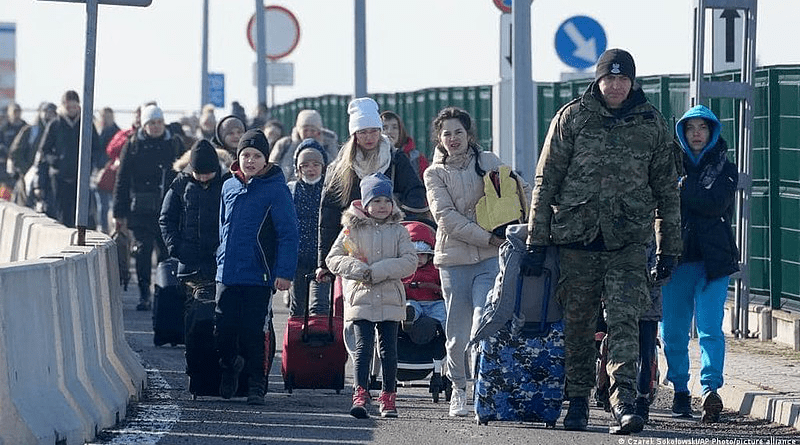EU To Step Up Human Trafficking Prevention For Ukrainian Refugees
By EurActiv
By Giedre Peseckyte
(EurActiv) — Since the start of the Russian invasion, over four million people have fled Ukraine. Despite being welcomed in many European countries, those refugees are at risk of falling prey to human traffickers.
“For predators and human traffickers, the war in Ukraine is not a tragedy. It’s an opportunity – and women and children are the targets,” United Nations Secretary-General António Guterres warned.
Despite UN reports about the trafficking of Ukrainian refugees, the EU “has had very few formally reported investigations or cases of trafficking,” Ylva Johansson, the bloc’s home affairs commissioner, told the European Parliament’s committee on women’s rights and gender equality on Tuesday (29 March).
“I spoke with IOM [The International Organisation for Migration] last Sunday, they see a lot of cars with criminals that drive [to the border] to pick up vulnerable people, women and children, especially for sexual purposes, but it could also be for other purposes,” she said.
Figures from the UN Refugee Agency show that around 90% of refugees from Ukraine are women and children. The UN Office on Drugs on Crime (UNODC) Executive Director Ghada Waly said they are “particularly at risk of human trafficking and exploitation”.
“The longer a conflict lasts, the more vulnerable they can become as they struggle to start a new life. We need to take urgent and determined action to protect people and prevent them from falling victim to traffickers,” she said.
The trafficking of Ukrainian victims is already well-established and criminal networks operate between Ukraine and countries in Europe and Central Asia. Johansson said that before the war, Ukrainians were among the most common victims of trafficking into the EU.
UNODC Global Database findings show that in 2018, Ukrainian victims were trafficked to 29 countries. Over half were identified in the Russian Federation and a quarter in Poland, which has received the highest number of refugees since the war began.
What is done to prevent human trafficking?
The UNODC says that temporary protection, which was activated at the beginning of March, is one of the actions that ensure access to essential services.
“Swift actions were taken by many European countries to allow refugees to safely cross borders and receive humanitarian visas offer temporary protection and have significantly reduced the need for those fleeing to resort to migrant smugglers,” said Ilias Chatzis, chief of the UNODC section on human trafficking.
But he added that “the risk of trafficking will not go away in the short term. We are seeing massive numbers of refugees. If they are not properly supported, the risk of exploitation will increase”.
Therefore, UNODC wants anti-trafficking efforts to be strengthened, including the early detection and prevention of related criminal activity and the identification and protection of victims.
A network of national anti-trafficking coordinators in all EU member states was activated during the first weeks of the war, Johansson said.
“National police are doing checks of the cars and they are doing checks of the homes where people are staying in private homes,” the Commissioner said but added that “this is really an area where more needs to be done”.
Lack of registration and unaccompanied minors
A big concern is registries and unaccompanied minors. As of Tuesday, roughly half of the refugees were children. “1.8 million children have come to the EU. And most of them are registered in a national registration but we don’t have an EU-wide registration,” Johansson said.
Of those children, 2,300 were registered as unaccompanied minors “but UNICEF estimates that we have received 6000 unaccompanied minors, so there is a risk of a lack of registration,” the Commissioner highlighted.
She added that “registration is key when it comes to avoiding missing children but also to help to reunify families that might have been split on during the journey”.
Registration is addressed in the 10-Point Plan for stronger European coordination on welcoming people fleeing the war in Ukraine that was presented to EU justice and home affairs ministers on 28 March.
Johansson announced that an EU-wide platform for registration needs to be created “as soon as possible.“
Stepping up the fight against human trafficking is also in the plan. “We are also developing this special anti-trafficking plan based on the strategy on combating human trafficking that we presented one and a half years ago,“ Johansson said but added it was going to need additional financial support.
The Commission is also working on guidelines on unaccompanied minors with a focus on specific procedures for the transfer of unaccompanied minors.

